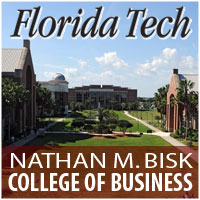Recent Publications from the Nathan M. Bisk College of Business

Dr. Mardi Sale has article published in Journal of Accounting and Finance
“Theory of Constraints as Related to Improved Business Unit Performance”
Abstract: This paper provides an overview of the importance of The Goal by Goldratt and Cox twenty-five years after its publication introduced the Theory of Constraints (TOC). It highlights the degree of acceptance TOC has gained in practice. In light of the continued paucity of empirical support for the technique, it reports the results of an empirical analysis of TOC adopters. The study results support several of the elements of TOC as significantly related to business unit performance.
Citation
Sale, Martha L. and R. Samuel Sale. (2013). Theory of Constraints as Related to Improved Business Unit Performance. Journal of Accounting and Finance. 13(1)
To learn more about Dr. Martha Sale please visit her faculty page:
http://www.fit.edu/faculty/profiles/profile.php?tracks=msale
Dr. Michael Workmanhas article published in Computers in Human Behavior Journal

Abstract: Office outbursts are often associated with impulsive reactions to something that is said or done that aggravates an individual by offending his or her beliefs, expectations, sensibilities, or principles. Vengefulness is linked to needs for retribution (until satisfied) for a perceived offense. An unsettled issue is whether these antecedents are also manifested in electronic expressions known as cyber smearing. Free speech by constitution and legislation in the US, UK, EU have been held as a cherished value and basic right, but the rights to free speech are not unlimited and in fact are legally constrained to varying degrees regarding issues such as related to privacy, defamation, and harassment. Cyber smearing is a campaign waged to damage the credibility or reputation of others over the Internet. Using a randomized study we investigated rash impulsivity, vengefulness, and anonymous identity (a virtual self), as factors contributing to cyber smearing, and we found that when people who lack self-control and have tendencies to seek revenge especially when shrouded in anonymity of virtual self and concomitantly have high tendencies toward cyber smearing. We also found that those who hold the view in which ethical standards are situational and relative amplifies these cyber smearing behaviors.
Citation
Workman, M. (2012). Rash impulsivity, vengefulness, virtual-self and amplification of ethical relativism on cyber-smearing against corporations. Computers in Human Behavior Journal, 28, 217-225.
To learn more about Dr. Michel Workman please visit his faculty page:
http://www.fit.edu/faculty/profiles/profile.php?tracks=workmanm





